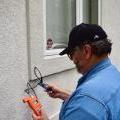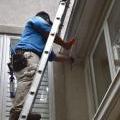EIFS Inspection
Cranor Inspection Services offers a full range of Exterior Insulated Finish Systems (EIFS) and Adhered Stone Inspections. John Cranor is Certified by the Exterior Design Institute (EDI) as a Moisture Analyst/ Building Envelope / EIFS & Stone Inspector. Exterior Design Institute is a non-profit organization that trains and certifies inspectors to raise the quality of EIFS inspections in the construction industry. The only accurate method to measure moisture in a building is to intrusively probe the exterior wall. Probing allows access to structural areas where hidden elevated moisture causes problems. The testing maps the extent of the moisture and possibly shows where the moisture intrusion begins.


John Cranor is available for EIFS inspections. Please email him at John@Cranorinspections.com and he will respond to your inquiry within 24 hours.
WHAT IS EIFS?
Exterior Insulated Finishing System (EIFS) is commonly referred to as synthetic stucco or Dryvit.
There are basically two types of EIFS, “Barrier EIFS” and “Water-Managed/Drainage” EIFS, most EIFS applications prior to 2000 utilized the barrier system. In a typical EIFS application the Expanded Polystyrene (EPS) or Polyisocyanurate (PI) foam board is mechanically and/or adhesively fastened to an approved substrate. A fiberglass reinforced mesh is then applied to the foam board and fully embedded in a basecoat. A finish coat is applied to the base coat which gives the wall its stucco appearance. In the mid-‘90s concerns arose over the performance of EIFS. As many EIFS homes were inspected, moisture intrusion and damage to substrate and framing was frequently discovered.
Barrier type EIFS is totally dependent on the face-seal approach which has become a problem throughout the country because no siding material can be made completely waterproof. The water that does manage to penetrate the EIFS becomes trapped in the wall, leading to rot and mold. The better system came along in the late 1990's which is referred to as drainable EIFS; designed to allow penetrating water to drain out behind the system. They are referred to as water managed EIFS. These systems are much more resistant to moisture damage, but they can also fail if they are improperly installed or not maintained.
All major manufacturers of EIFS such as Dryvit, Sto, Parex and Senergy recommend “regular” inspections and maintenance. However, a general home inspection is a visual inspection which cannot identify moisture problems as rarely are there signs of problems until the structural damage has progressed to a significant stage. Therefore, intrusive moisture testing is critical.
In areas that experience extreme weather cycles; like Central VA, with cold temperatures in the winter and hot sunny days in the summer, these extremes cause structural movement which in turn causes sealant joints to fail. Then add frequent rain, high humidity, and high indoor/outdoor temperature differences, there is a great potential to trap water and cause damage to the structure of the house.
John Cranor, of Cranor Inspection Services, LLC has 24 years experience as a home inspector and has the advanced training and is a Exterior Design Institute Certified Building Envelope Inspector and Certified through the Moisture Warranty Corporation. Utilizing specialized tools and the standards and protocols developed by industry recognized experts, John has the credentials to to provide the comprehensive inspection for moisture intrusion and entrapment inside EIFS claddings.
If you would like to view some of the problems that moisture intrusion can cause, go to the New Hanover (NC) site for pictures. http://www.nhcgov.com/ins/eifs/eifs001.htm
If you would like to see what the EIFS industry has to say about the issues, got to the EIMA website, www.EIMA.com .

